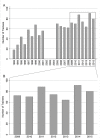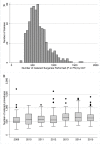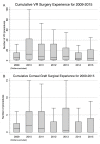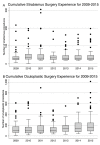Changes in UK ophthalmology surgical training: analysis of cumulative surgical experience 2009-2015
- PMID: 28988187
- PMCID: PMC5640272
- DOI: 10.1136/bmjopen-2017-018526
Changes in UK ophthalmology surgical training: analysis of cumulative surgical experience 2009-2015
Abstract
Objective: To investigate changes in the patterns of cumulative surgical experience for ophthalmologists in the UK following the introduction of a new national training scheme.
Design: Retrospective review of all surgical training records submitted to the UK Royal College of Ophthalmologists by trainees for the award of Certificate of Completion of Training (CCT) for the period 2009-2015.
Setting: Secondary level care, UK.
Participants: 539 trainees achieving CCT over the 7-year study period.
Interventions: Higher specialist training or ophthalmology specialist training.
Outcome measures: Number of CCT awards by years and procedures performed for cataract surgery, strabismus, corneal grafts, vitreoretinal (VR) procedures, oculoplastics and glaucoma.
Results: Cataract surgical experience showed little change with median number performed/performed supervised (P/PS) 592, IQR: 472-738; mean: 631. Similarly, the median number of strabismus (P/PS 34), corneal grafts (assisted, 9) and VR procedures (assisted, 34) appeared constant. There was a trend towards increasing surgical numbers for oculoplastics (median 116) and glaucoma (57). Overall case numbers for ophthalmic specialist training (OST) trainees (7-year training programme) were higher than higher surgical training (HST) trainees (4.5-year programme) with the exception of squint (P/PS), corneal grafts (P/PS) and VR cases (P/PS).
Conclusions: Overall case numbers reported at time of CCT application appear stable or with a marginal trend towards increasing case numbers. HST (4.5-year programme) case numbers do not include those performed before entry to HST, and although case numbers tended to be higher for OST trainees (7-year programme) compared with HST trainees, they were not proportionately so.
Keywords: cataract and refractive surgery; medical education; ophthalmology; resident; surgery; training.
© Article author(s) (or their employer(s) unless otherwise stated in the text of the article) 2017. All rights reserved. No commercial use is permitted unless otherwise expressly granted.
Conflict of interest statement
Competing interests: None declared.
Figures





Similar articles
-
Ophthalmology specialist trainee survey in the United Kingdom.Eye (Lond). 2019 Jun;33(6):917-924. doi: 10.1038/s41433-019-0344-z. Epub 2019 Feb 1. Eye (Lond). 2019. PMID: 30710112 Free PMC article.
-
Higher surgical training in ophthalmology: trends in cumulative surgical experience 1993-2008.Eye (Lond). 2010 Sep;24(9):1466-73. doi: 10.1038/eye.2010.54. Epub 2010 Apr 30. Eye (Lond). 2010. PMID: 20431607
-
Confidence of ophthalmology specialist trainees in the management of posterior capsule rupture and vitreous loss.Eye (Lond). 2016 Jul;30(7):943-8. doi: 10.1038/eye.2016.55. Epub 2016 Apr 15. Eye (Lond). 2016. PMID: 27080483 Free PMC article.
-
Resident laser refractive surgery training.Curr Opin Ophthalmol. 2010 Jul;21(4):265-8. doi: 10.1097/ICU.0b013e32833a8967. Curr Opin Ophthalmol. 2010. PMID: 20467320 Review.
-
Selection, teaching and training in ophthalmology.Clin Exp Ophthalmol. 2005 Oct;33(5):524-30. doi: 10.1111/j.1442-9071.2005.01089.x. Clin Exp Ophthalmol. 2005. PMID: 16181283 Review.
Cited by
-
Harmonizing ophthalmic residency surgical training across Europe: A proposed surgical curriculum.Eye (Lond). 2023 Oct;37(15):3256-3262. doi: 10.1038/s41433-023-02502-2. Epub 2023 Mar 17. Eye (Lond). 2023. PMID: 36932160 Free PMC article.
-
Ophthalmology specialist trainee survey in the United Kingdom.Eye (Lond). 2019 Jun;33(6):917-924. doi: 10.1038/s41433-019-0344-z. Epub 2019 Feb 1. Eye (Lond). 2019. PMID: 30710112 Free PMC article.
-
Junior doctors' aspirations for careers in ophthalmology: 40 years of surveys of UK medical graduates.JRSM Open. 2020 May 6;11(5):2054270419892155. doi: 10.1177/2054270419892155. eCollection 2020 May. JRSM Open. 2020. PMID: 32523702 Free PMC article.
-
Surgical Grade and Repeat Laser Peripheral Iridotomy Procedures with Risk Stratification and Educational Considerations.Clin Ophthalmol. 2020 Dec 8;14:4319-4323. doi: 10.2147/OPTH.S283370. eCollection 2020. Clin Ophthalmol. 2020. PMID: 33335384 Free PMC article.
-
Stress and cataract surgery: A nationwide study evaluating surgeon burnout.Eur J Ophthalmol. 2023 Jul;33(4):1640-1649. doi: 10.1177/11206721231154611. Epub 2023 Feb 3. Eur J Ophthalmol. 2023. PMID: 36734150 Free PMC article.
References
-
- Royal College of Ophthalmologists. Ophthalmic specialist training (internet). London: Royal College of Ophthalmologists, 2009. https://www.rcophth.ac.uk/training/ost-information/ (accessed 30 Jan 2017).
-
- History of Johns Hopkins school of medicine (internet). http://www.hopkinsmedicine.org/surgery/about/history.html (accessed 24 Jan 2017).
-
- Calman K. Hospital Doctors: training for the future. the report of the working group on specialist medical training. London: HMSO, 1993.
-
- NHS Management Executive. Junior doctors: the new deal. London: NHS Management Executive, 1991.
-
- Loveland P. The New deal: an account of progress in reducing junior hospital doctors' hours in England. Health trends 1992;24:3–4. - PubMed
MeSH terms
LinkOut - more resources
Full Text Sources
Other Literature Sources
Medical
